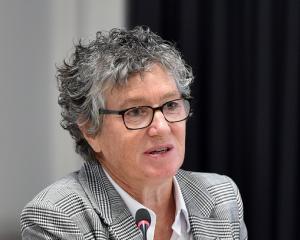A ''large spike'' in the supply of some controlled drugs to a Dunedin Hospital ward occurred not long after an English nurse began working there, a disciplinary tribunal heard in Dunedin yesterday.
The Health Practitioners Disciplinary Tribunal later yesterday upheld a professional misconduct charge against the registered nurse, Julie Powell, now living in the United Kingdom.
The charge, brought by the professional conduct committee (PCC) of the Nursing Council of New Zealand, alleged that between June 1 and July 31, 2012, Ms Powell, while employed as a registered nurse at the hospital's ward 8A, had ''misappropriated and/or removed'' prescription medication from her workplace, for her own use or some other use.
Ms Powell was not represented at the hearing, and the tribunal heard she had not responded to information about the charge.
The tribunal subsequently cancelled Ms Powell's New Zealand registration, censured her and directed her to pay $16,000 in costs - $10,000 to the tribunal and $6000 to the PCC.
This was 40% of about $40,000 in overall costs involving the misconduct matter, comprising PCC costs of $15,000 and estimated tribunal costs of about $25,000. The tribunal comprised chairwoman Maria Dew, Marie Taylor-Cyphers, Dr Marian Bland, Sue Matthews and Chris Taua.
Dunedin Hospital chief pharmacist Craig MacKenzie said a graph linked to a monthly report to ward 8A from the ward pharmacist showed a ''large spike'' in the supply of codeine 30mg tablets to the ward in June 2012, compared with the previous four months.
Another ''large spike'' involved the supply of tramadol 50mg capsules.
A total of 320 capsules of medication had been sent by the hospital pharmacy to the ward in July, which appeared to be ''the highest amount we have ever sent in one month to ward 8A''.
After the spike in medication issuing over June-July, the later issuing returned to more normal levels for the rest of 2012, he said.
The tribunal found that six of the nine ''particulars'' listed in the charge, namely items one to five and nine, had been individually established and other particulars were ''cumulatively'' established.
Among the particulars individually upheld were the misappropriation of codeine phosphate 30mg tablets, and tramadol tablets on several occasions, and the taking of diazepam tablets.
Southern District Health Board patient safety and policy adviser Kim Caffell, who was a nursing director at the hospital in 2012, said ward 8A staff noticed medication was going missing ''not long'' after Ms Powell started work in late April that year.
She had been recruited from the United Kingdom.
On June 28, Ms Powell had picked up 100 tramadol 50mg capsules from the hospital pharmacy and a later count at the ward on July 6 showed that only 46 remained.
Ms Caffell said the charge nurse manager Lianne van Egdom had contacted Dunedin police on July 11 after substantial discrepancies were noticed between oral drugs obtained from the hospital pharmacy, what was administered to patients, and what remained in the ward at the end of June.
These discrepancies included more than 200 codeine 30mg tablets, 70 codeine 60mg tablets, about 350 tramadol 50mg capsules and more than 50 diazepam 5mg tablets.
The tribunal also heard it was ''unusual'' for a nurse who had been in a department for only a short time to be ordering and uplifting medication from the hospital pharmacy.
A search warrant was subsequently executed at her address.
After 50 of the 50mg tramadol pills from a hospital batch were found there by police, Ms Powell said she had not stolen them but had taken them home accidentally after becoming distracted at work.
At a sentencing hearing in the Dunedin District Court on September 12, 2012, Judge Stephen O'Driscoll discharged Ms Powell, then aged 40, without conviction after she had admitted, at a court hearing on August 13, a charge of theft involving taking 50 tramadol tablets, as well as 40 60mg codeine tablets, and 51 of 30mg codeine tablets, on July 19.
Judge O'Driscoll declined to suppress her name.












